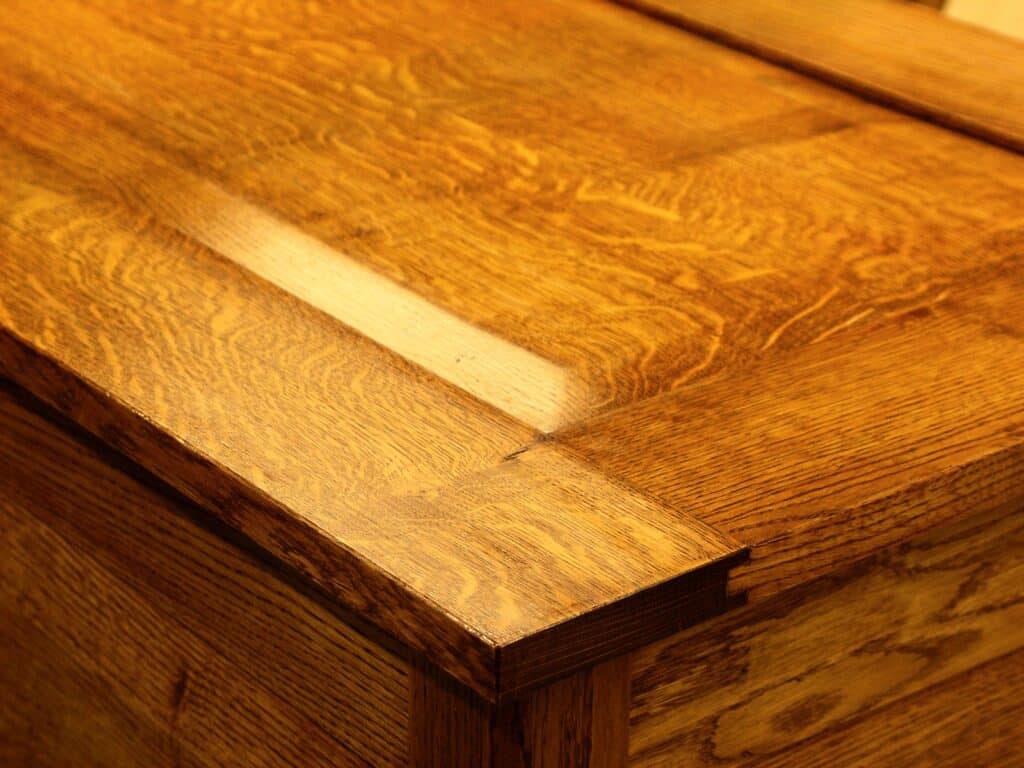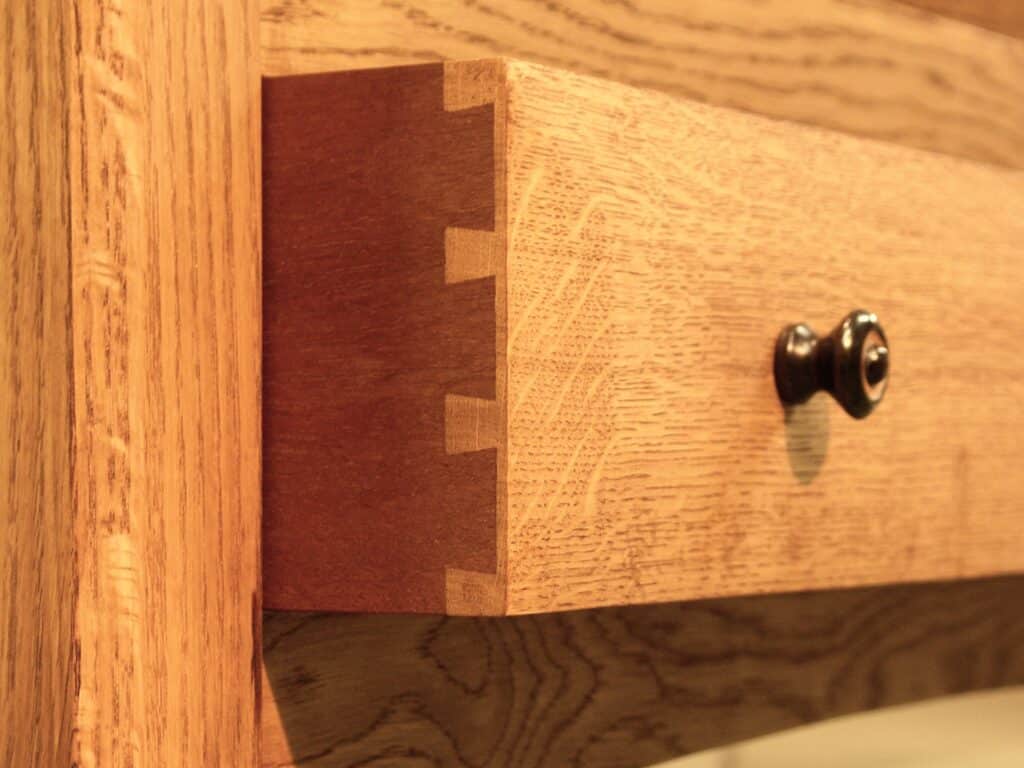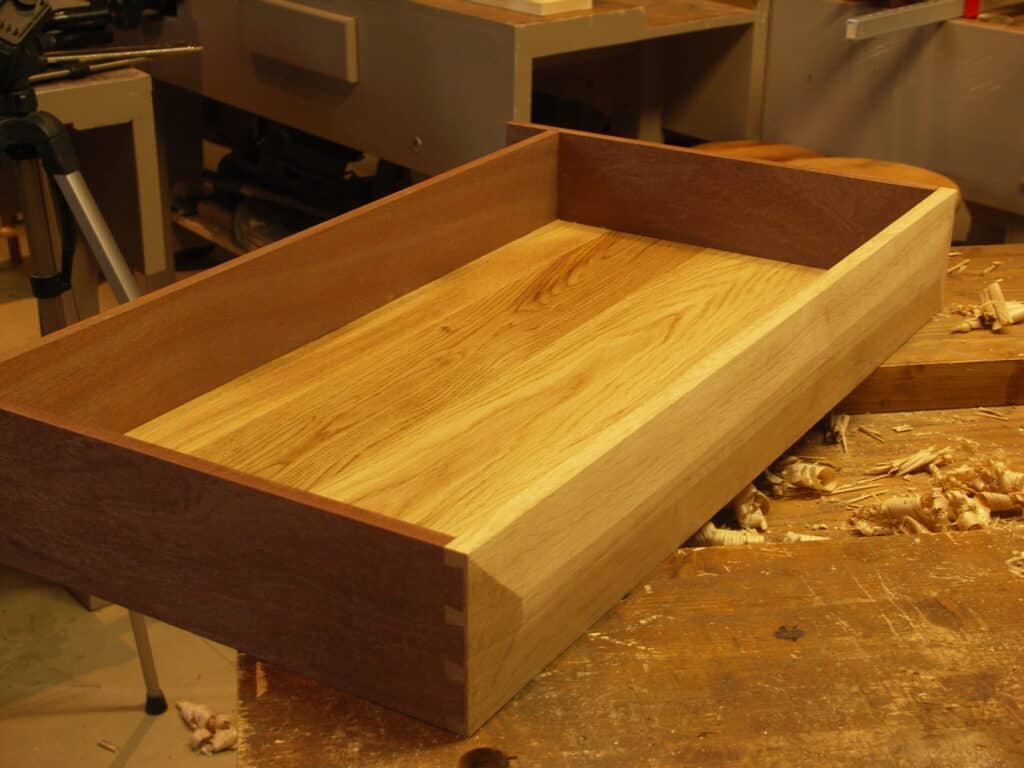Perfection Comes to All
I have written on the illusion of perfection before now. How in some fields perfection is a number, a calculation; it follows that in some fields an outcome can indeed seem to be perfect, or at least it might seem perfect at the time and then for a period too. The Swedish inventor of a perfected solution for carrying things from place to place and storing things like food can no longer claim perfection in his invention that went on to choke every corner of the earth and pollute even the purest of intent. Surely plastic still has many redeeming qualities too – those plastic pots that arrive one inside the other in lots of fifty are reused many times – lightweight too! But I am not talking of this kind of perfectness. Many things make life better and don’t end up in the landfill and the ocean deeps. The wood I use and make for life don’t follow such a path. MDF and pressed fibreboard goods eventually do.

I try to imagine how many times I have surprised myself by perfection in my work. I sweep my shop and see the order of something completed and though I might not say it out loud I often say in my head, “Perfect!” That first shaving from my plane when just sharpened gets the same exclamation. So many things deserve such praise but what of the ill-fitting joint with the hairline gap and the hairline crack by the outer pin of a dovetail recess? What of the scarcely visible grain flaw when the fourth coat of varnish dries and shines but exposes a missed spot that could have, no, should have, been scraped a stroke more? Three joints aligned with one another perfect a breadboard end with a solidity that will last for two centuries of daily use and more. Great joy and wellbeing came with the making. Serotonin encouraged the gut in that undefined fourth dimension only making seems apt to give. A day of making, no two, and then three and a fourth too, filled your mind with an indescribable loveliness. All seemed flawless in the book-matched unison of heart and soul and mind as the halves melded seamlessly together within the framework of your working. The experience was so incredibly multidimensional you were breathless at times, as the excitement gushed back and forth. You had to stop from time to time to absorb the purest of delights as your hands traced their fingertips over the parts, like a parent the parchment skin of their newborn in their arms.

I have been in this place many times in my making life. There is indescribable happiness in such moments that can send tears to your eyes and it is this that few can know and speak of. Your hands fashioned something that hitherto did not exist and it came from a handful of tools and a human hand and mind. The three joints hold well a perfect flatness to the end of the tabletop. You look at the edges of the mortises and you see an undulation you didn’t see moments before because of your delight. You think for a delete button, but none exists. You look for a layer in the toolbar, but that too has not been created. You want to hide the mistake because another will come and point out your flawed work, you will seem, well, more human, less super. Oh, the rejection! There must be a matching filler somewhere, surely. Shall I make an inlay to cover the unevenness? Do not let that enemy rob you of the joy you felt in the challenges of making. Does the unevenness diminish the longevity of your wonderful working? No! Go back to the school days, the mocking days by friends, a rogue teacher, the disappointment days and the bad results when examples were made of those who did no more than judge and criticise. What of the bully days, the aggression days, the ways others manipulated life for an outcome and you will find the hidden spheres where we lost childhood and become the man-pleaser and the woman-pleaser and the constant striving for that illusive approval and acceptance by peers. Take a look at life back there where nothing you did seemed good enough for others and you tried so hard to please them. It’s no small thing to put an end to those influential days present still in your current work. A day comes when we stop striving for the approval of another in what we make and we can be the true artist we are. This condition of settledness defies our past and we settle for the very best we can do in our working. This is peace!

Gaps, an over-shot cut, a missed mark by a minute margin in a momentary lack of concentration. These are of no consequence to the honest man and the true crafting artisan. The joy in the working should never be destroyed by such things. Never point out your disappointed point in a project to another, for most will never know or understand that of which you might speak. Remember that joyfulness in the saw’s stroke sliding by the new dovetail and the chisel’s paring to the knifewall. Don’t forget it, hold to it, record your happiness in it, in the privacy of your wonderful mind. Concentrate on these things. Every so often, I am surprised by perfection in my work as if something happened more by accident than intent. For me, it is more the rarity than the norm. Such surprises are the gemstones of making, but then there are the diamonds yet to be cut and these come only in the making of what you craft. They are woven into every piece you make. Happiness, joyfulness, silences, sensing, texturing, the fitting of a well-made joint. These are the diamonds to remember the reflecting facets of refracted light, they’re the colour in our making day to day.


Mr. Sellers, I SO love your eloquent, thoughtful writing when your woodworking thoughts embrace the bigger picture, the life experiences, the reality that is so much more powerful than the beautiful woodworking we all share and enjoy. I’ve taught a college class on entrepreneurship here in the American Midwest and have encouraged the budding entrepreneurs to not fear, but rather embrace, the many small mistakes that so many are hindered by, failing to make sound progress, simply being held back by the fear of ridicule or loss of face. Your words here are both magic and right. Bravo! Very well said. I love your writing.
Dear Paul,
These thoughts are very powerful.
You help so many, not only by teaching hand tool woodworking but ever more so by sharing your life lessons, openly, with much care for us, and with understanding the true sources of happiness and what really matters in a good life.
I write this with deep gratitude.
Thank you, my friend!
Hans
Very good read this morning. Thank you Mr. Sellers.
David
As I prepare for church this morning and take a moment to read your blog post, I’m reminded that the word prefect is used many times in the new testament of the Bible. Only two or three of those times does the word actually mean, with out flaw. Even in the Websters dictionary, with its tinny fount, in its 6 inch long list of definitions, only give one line to say, with out flaws. The rest all state the meaning to be, complete, restored, repaired, and the like. A perfect job of making is often simply to say it is complete. It’s is complete and I am satisfied with the job I have done. So, it is perfect. Thank you Mr Sellers for another wonderfully inspired writing.
Jon
Hello Sir, Thank you for sharing your thoughts. I’m a retired Operating Room Nurse. There’s another kind of perfection. One sees it often in the practice of Medicine, Surgery and Nursing. There is little, if any peer pressure to perform perfectly. There is quite a bit of pressure should one fail. I’m fortunate… I’m currently being treated for a possible Pacemaker infection. The Physicians and Surgeons treating me are functioning as close to perfection as is possible. In these fields one is expected to perform perfectly. They do and are only rarely recognized for their efforts. For this I am very grateful.
I thought about mister sellers today as I was making a birdhouse. I imagined he was standing behind me and encouraging me to make that cut straight or saying “ you missed that Jim”. Thinking that way helped me to stay on the straight and not too narrow. It is refreshing to know he cares about his people and beyond by reminding us enjoy ourselves, and yes I will be surprised and happy when the flying squirrel moves into my birdhouse. I love squirrels. That’s true too.
In my shop I am happy when a project is “as it should be” or in some cases “as good as it will be”. I try to keep in mind that we are dealing with an organic product that will never be perfect. To me, learning comes from the mistakes and sometimes I can come up with a way to make it either disappear or go away. That is part of the challenge of this hobby and an aspect that I enjoy. Sometimes every day is a learning curve.
What a perfect description to us of a man or woman at peace with their lot in life.
Like the old saying goes,
“If perfection was attainable it wouldn’t be worth having”
Perfection is in the eye of the beholder. When I make something I am always aware of the tiniest defect (although there are probably more). But other people seem not to be aware if the item is pleasing to the eye. Maybe it is like from my military past when “bulls..t baffles brains”, if is shined and polished then the defects are not so obvious. (In this case shined and polished are not literally that but otherwise we’ll made and proportioned.
Paul,
Thank you for your thoughtful encouragement. In previous responses I have mentioned how, in the past, I have struggled with chasing perfection in my work. I’ve also mentioned that I have stopped doing that. In chasing perfection I wanted to be seen as something other than a flawed human being. I’m 52 now and have accepted my human frailty. If my work isn’t perfect by someone else’s standard so be it. I see it this way, I can chase perfection and be a an absolutely miserable person, knowing that I’ll never catch it, or, I can accept the flaws in my work and strive to learn from them, knowing that I might make them again. The mistakes and flaws are okay and accepting them is therapeutic. With this can come perfect peace of mind.
I’ve learnt to know what you are talking about. You taught me. I spent almost every day of the last year perfecting my skills with your guidance. And I felt what you described here. If only I was as good in life as I’ve been last year in the workshop !!! Perfection in woodworking surpassed largely perfection in my life… When I look back at those days I feel such a deep melancholy.. I still need to learn a lot…
And the wonderful thing is that we can all put our past works aside and start over. Just like woodworking, Max.
You are a craftsman in every sense, even with words. Thank you for all you’re doing.
“To strive, to seek, to find, and never to yield …”
— Alfred Tennyson
Your words are a welcome and sage elaboration of the lives that woodworkers (and others) lead: trying to be the best they can and yet learning to be open to appreciate the process and celebrate the attempt, as well as the successes and near-successes, along the way.
With thanks,
Frank
Thanks Paul! I needed to hear this!
Mmmm I have a fear, it’s small, but persistent and I am cross with myself for never having come up with a ‘one answer fits all’ reply. Sometimes I will avoid social situations because of this ‘little demon that still sits on my shoulder sprinkling his ‘doubt yourself ‘ dust on my shoulders like dandruff. This week i performed my perfected ‘body swerve’ to avoid something, or some people, it was a rugby club meeting where my sons friends parents would be, and it’s that one question that keeps me away…..’so Philip, what is it you do?’….. at 57 you’d think the answer would be easy, but for me it isn’t, because I love to create, make things, it’s the experience of creating not the end result. I love to see the hand of the ‘honest’ maker in things, whether it’s a film, a drawing a Morris chair or a repousse panel of copper set in a piece of two hundred year old oak. It is the signature from anonymous hands that work on a branch of an evolutionary path of handed down knowledge going back to when we poked sticks in holes to lick the honey from a hive. I’m not wealthy, and never will be financially, when I had a lucrative film career it couldn’t satisfy me because my creations became shaped by the rules of the producers who were paying the bills, so I quit. Spiritual satisfaction cannot be bought, though I believe it is the pinnacle of human evolution, the rugby dads might scoff at my twenty year old car and small comfy house (that I actually own) because it doesn’t yell ‘I’m a winner, Iam successful!’
It whispers ‘I am content’……so who is the loser?
I digress! But if you have read this thoughtful meander we have some things in common, possession of our own time to do as we please and the recognition of the importance of balance in life. Simple pleasures the time bandits of commerce and profit don’t allow us. So yeah, I’m filthy rich! And love that I can see the delicious irony of wanting to learn how to sharpen an old chisel and the resultant benefit of paul sellers open invite to his hand carved kingdom. My grandad was a furniture maker, a happy man, a quiet man, only after leaving the noisy chaos of London am I starting to understand the wisdom of simplicity and honesty in ones daily life. I’m trying to let my son find this by not pressuring him into the ‘best career paths’ meaning most lucrative, it ain’t easy but it seems to be working, he’s the nicest fourteen year old I know!
Peace out potential friends….I enjoyed a quiet ten minutes thinking in my little garden, should do it more often 👍🤝🙏✌️
In Japanese culture there is wabi-sabi, basically the concept of imperfection.
This is from Wiki :-In traditional Japanese aesthetics, wabi-sabi (侘寂) is a world view centered on the acceptance of transience and imperfection. The aesthetic is sometimes described as one of appreciating beauty that is “imperfect, impermanent, and incomplete” in nature. It is a concept derived from the Buddhist teaching of the three marks of existence (三法印, sanbōin), specifically impermanence (無常, mujō), suffering (苦, ku) and emptiness or absence of self-nature (空, kū).
Characteristics of wabi-sabi aesthetics and principles include asymmetry, roughness, simplicity, economy, austerity, modesty, intimacy, and the appreciation of both natural objects and the forces of nature